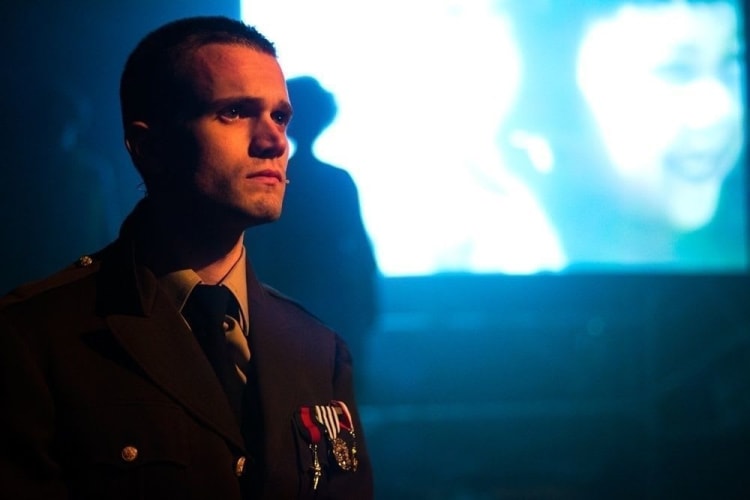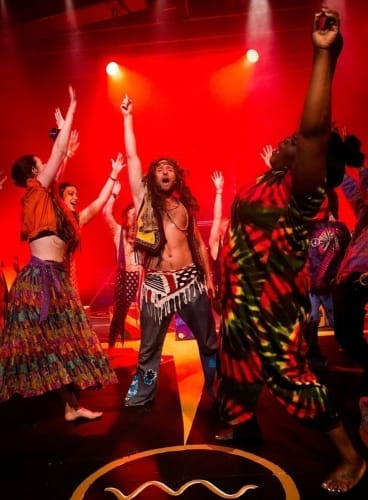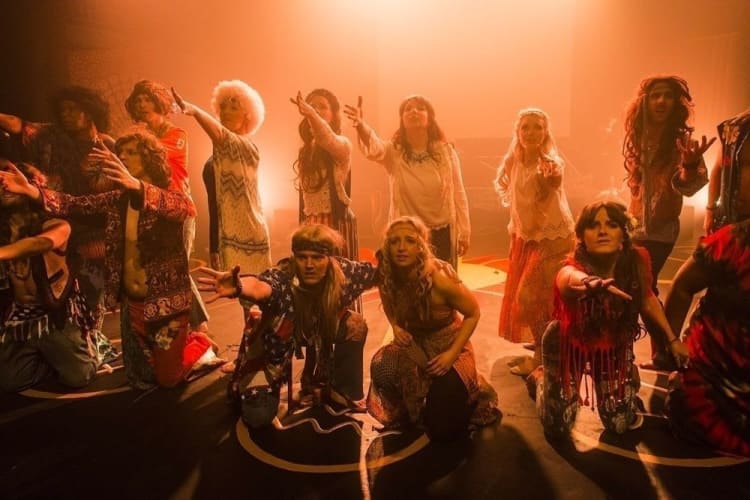The musical Hair is set in America of the late nineteen sixties, a place deeply divided over its ruthless invasion of another country, its violent abuse of ethnic minorities and the new freedoms being expressed by the young.
All this creates a tension in the music from the opening funk strains of the uplifting song "Aquarius" through the marching anthems to the grief and fury of the final sequence.
Geoids Musical Theatre’s exciting production of Hair combines the very effective skills of joint directors Julie Kleinsteuber and Edward Steward. There is a confident, invigorating pacing to Edward Steward’s musical direction which is matched by the imaginative, constantly active choreography of Julie Kleinsteuber. The movement and music are always completely tuned to the meaning of the lyrics which, because of the excellent sound balance, you can always hear clearly.
The great musical moments were always going to be the ensemble singing of the entire cast as the tribe who have an extraordinary knack of shifting pace, tempo and harmonies with a speed and conviction that could leave you breathless.
There were also many fine individual performances. Among them are Nichola Welch as Ronny singing "Aquarius" and the moving "Ain't Got No" sung by Dionne (Melisa Minton-Djoumessi), Woof (Lewis Simington) and Hud (Tashan Nicholas).
The show always has an eye for humour whether that is the policeman who arrives at the interval to arrest us all for watching some of the cast perform nude or as the black, woman Abraham Lincoln refusing to be shot by a white man.
The show centres on the resistance to conscription. Hud explains that "the draft is white people sending black people to make war on the yellow people to defend the land they stole from the red people".
They march, they hold a yippie exorcism of the army recruitment office and crucially they hold a collective burning of draft cards.
The central character Claude (Franciscus Prins), who is at one point described as Aquarius, a symbol of hope, cannot bring himself to burn his draft card.
In a final intense sequence, he appears, hair cut and in a uniform so large that his muscular body is no longer visible, and he resembles a small, vulnerable child.
The tribe sings "How Dare they end this beauty". On a back screen, film footage appears of smiling Vietnamese children followed by footage of American atrocities including the burning of villages and piles of dead Vietnamese bodies. Claude is shot dead. The tribe, wearing winter coats in grief and anger, some in tears, angrily sing "Let the Sun Shine In".
America is now again boasting of the numbers of human beings it is killing in other countries. The Pentagon tells us that the Coalition has killed nearly twenty-seven thousand ISIS fighters. It is a bit more evasive about the number of civilians it has killed.
Back in America, there are growing protests about the treatment of ethnic minorities and many of the young are crowding into the meetings of Bernie Sanders or mobilising around the Occupy movement.
Some things may be a bit different than when Hair first appeared. This time round, Britain has joined in the killing. But there is still enough about Hair’s form and content which places it on the advanced radical edge of musical theatre.


